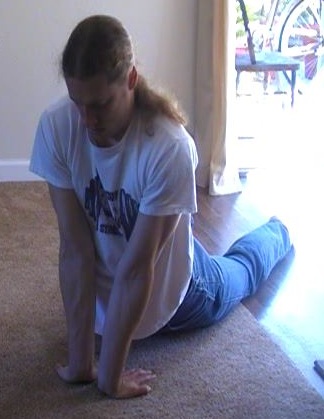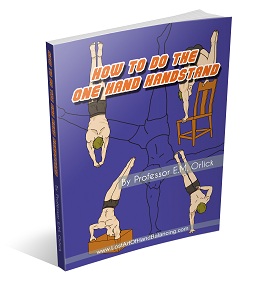Stretching for acrobatics whether hand balancing or tumbling, is a must. Well, actually I should say flexibility is a must.
But the only way to get flexible is stretching, right?
In most cases yes, but not always. Stretches are just one sub-set of movement that involves getting to your end range of motion. This is then usually held although there are variations here as well.
The truth is you can build your flexibility with movements that don’t involve anything that looks like stretching in some cases. A person that can’t do a full range squat, will improve their flexibility by working on squats, with or without weights. This alone can loosen up the calves, quads, hamstrings, hips and back to where they’ll eventually be able to achieve the full range.
That is one route. Specific stretches aimed at helping this person would be another.
Let’s say you are working on the handstand. Perhaps you need more shoulder or wrist flexibility.

A great stretch for wrist flexibility
What about handsprings? Additional shoulder and back flexibility can help. So can hip flexibility.
If you’re doing bridging movements, you need all around spinal flexibility, not to mention the shoulders and wrists.
I don’t like to “stretch” for stretching’s sake. If you do, that’s fine with me. Some people like it just because they feel good afterwards. But if I’m going to do it, I always have a specific purpose behind it.
My average training, and all the moves I do, give me more then enough flexibility to get through my everyday life, and to keep me generally flexible.
However, if I want to achieve a specific move, sometimes the best, or only route to achieving it is by increasing flexibility. Once again this can take the “movement” route or the “stretching” route. What I do really depends on the move, and in some cases is a combination of the two.
Now when we talk about stretching, there are several kinds. You have static stretching. You have various forms of isometrics or PNF stretching. Then you have dynamic stretching.
My personal favorite is dynamic. After all, dynamic movement is usually where you want to apply your new found flexibility. Still the others, especially the isometrics version, done right, can be a big help.
In any case, this is the framework of what I do. Pick a goal. Identify the different ways you can get there. Start with what looks like the best route, or often a combination of things. Put this into action. Adapt and continue to experiment from there. This applies to more then acrobatics stretching.
Here’s an example. In my progress towards a straight arm press handstand, I’ve realized one thing. If I had the right flexibility I could do the movement without problem. It’s really not a strength issue!
And the specific drill I’ve been working towards is what’s known as the Pancake. I would wager that most people that could lay their torso flat on the ground, could do a press handstand, if not right away, then with a little more work.
Yet having all the strength in the world for bent arm press handstands, is just not enough. I still work on other progressions towards the movement and am making progress. But I realize the biggest thing I can do for this exercise is too improve my hip flexibility. This just illustrates one specific case.
I recently came across a new resource on the topic of flexibility that I’ll be sharing with you later this week.




